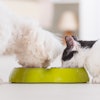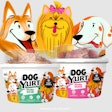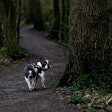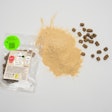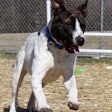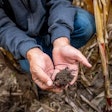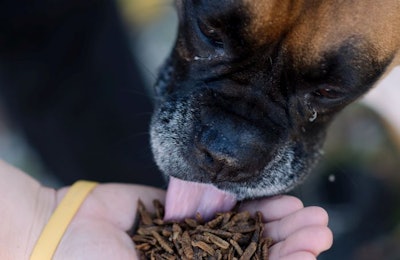
In feeding trials with both dogs and cats, pet foods made with insect-based ingredients had similar palatability and digestibility to kibble containing conventional pet food protein and oil sources. The dog and cat food ingredients came from black soldier fly larvae, which increasingly serve as both a protein and palatant in pet foods, as regulatory barriers fall away.
Ryan Yamka, founder of consultancy Luna Science and Nutrition, discussed the feeding trials using insect-based pet food ingredients, during his presentation at Petfood Forum 2019.
Insect-based dog food ingredient acceptability study
Researchers offered 20 Beagles bowls of kibble made with black soldier fly larvae protein, oil or a control with conventional ingredients. The bowls were offered individually for 30 minutes once daily for two days.
The control diet contained poultry by-product meal, brewers rice, corn, poultry fat, beet pulp, dicalcium phosphate, salt, potassium chloride, and a vitamin and mineral mix. In the experimental diets, insect-based ingredients replaced the poultry meal or the poultry fat. The researchers used three levels of black soldier fly meal (5, 10 or 20%) in one set of diets’ recipes. In the other experimental diet, the researchers applied black soldier fly larvae oil at three concentrations (1.0, 2.5 or 5.0%) to the exterior of the kibble.
Dogs readily accepted the kibble with black soldier fly meal at up to 20% inclusion and with insect-based oil at up to 5%. Those two values were used in the subsequent digestibility study.
Insect-based dog food ingredient digestibility study
In the digestibility trial, six dogs ate one of three diets, either the 20% insect meal, 5% insect oil or control kibble. For 10 days, the researchers offered the diets to the dogs once daily. After the first five days, the researchers began collecting fecal samples from the dogs for analysis.
Both the insect oil and protein diets had digestibility similar to the control diet. The dogs’ fecal quality was also similar in both the experimental and control diets.
Insect-based cat food ingredient acceptability study
Cats too found insect-based protein and oil ingredients palatable. Likewise, cat’s digestive systems handled the insect-based pet food ingredients as well as poultry products.
In the palatability study, twenty cats ate a variety of experimental pet food or the control over two days. Each formulation was offered individually for four hours.
For the cat acceptance feeding trial, the researchers used two levels of black soldier fly meal (5 or 20%). In the other experimental cat diet, the researchers applied black soldier fly larvae oil at three concentrations (1.0, 2.5 or 5.0%) to the exterior of the kibble.
The cats accepted the insect protein meal at up to 20%, but showed a lower palatability level than dogs for the black soldier fly larvae oil. In the digestibility study, the researchers used black soldier fly larvae meal at 20%, but oil at the middle 2.5% concentration on the exterior of the cat food. As with dogs, cats digested the insect-based ingredients’ nutrients at similar rates to poultry products.


